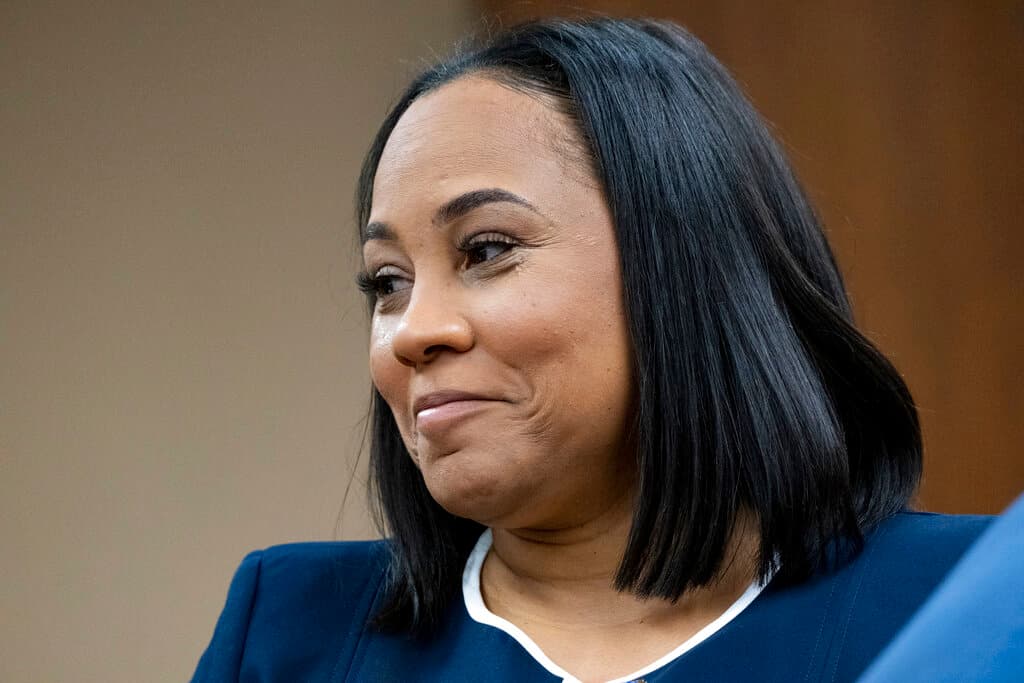If Jack Smith Falters in Prosecuting Trump, Fani Willis Is ‘Ready and Willing’
The district attorney of Fulton County observes that waiting to try Trump until after the election would be ‘silly.’

“Ready and willing” is how the district attorney of Fulton County, Fani Willis, describes her willingness to move up her racketeering case against President Trump should a slot open up on his litigation calendar.
Ms. Willis, speaking to the Atlanta Journal-Constitution and meditating on whether her office could kick into gear on short notice, related the maxim “Stay ready, you ain’t gotta get ready.” She also called the notion that Mr. Trump’s trial should be put on ice until after a potential second term for the 45th president “silly.”
The district attorney’s office has requested that her sprawling case — it comprises 15 defendants after four have struck deals with prosecutors — begin in August, a date arrived at in order to take into account Fulton County’s “sister jurisdictions” — New York, Florida, and the District of Columbia — where Mr. Trump faces three other criminal cases.
Judge Scott McAfee has not yet ruled on that summer start for jury selection. Ms. Willis’s office tells him that they can be ready to go to trial within 30 days. Racketeering cases are rarely brief affairs. One mounted by Ms. Willis against a ring of public school teachers that lasted eight months is the longest in the state’s history. Another, against the rapper Young Thug and his associates, is currently in full swing and spent months in jury selection alone.
Mr. Trump’s attorney, Steven Sadow, has signaled that he intends to challenge that proposed August date. The length of those related trials means that proceedings would potentially begin when Mr. Trump is the Republican nominee and could stretch into a possible second term. The spectacle of a sitting president standing trial on state charges — a scenario chock full of constitutional complications — would ensue.
Mr. Sadow appears to be preparing to ask for a start date in 2029 after that potential second spin for Mr. Trump in the White House concludes. He is likely to argue that the Supremacy Clause — which ordains that federal law, treaties, and the Constitution are the “supreme law of the land” — precludes a state prosecutor from trying the commander in chief, who is entrusted to “take Care that the Laws be faithfully executed.”
While Mr. Trump’s team eyes a trial five years hence — that’s the brewing request that Ms. Willis finds “silly” — the prosecutor appears to be mulling a more immediate window with her promise to be “ready.” It is likely that she is closely tracking developments more than 600 miles to the north at the District of Columbia. That is where Special Counsel Jack Smith’s case against Mr. Trump is approaching an inflection point.
The special counsel, who is prosecuting Mr. Trump for efforts to overturn the 2020 election, has secured both the earliest start date for any of the 45th president’s criminal trials — March 4 — and, in Judge Tanya Chutkan, a jurist who appears committed to sticking to that schedule. The case, though, is now largely out of her hands as the crucial question of presidential immunity is now before both the riders of the D.C. Circuit and the justices of the Supreme Court.
Mr. Smith has requested — and been granted — what he allows is an “extraordinary” dispensation from the Nine in the form of an expedited hearing on the immunity question. He is urging the D.C. Circuit to act with similar dispatch, an aggressive approach that telegraphs his concern that the immunity dimension of his case could snarl the proceedings in delays. The trial before Judge Chutkan is suspended pending its resolution.
It could be tempting for Ms. Willis to try to claim Mr. Smith’s March date should the mechanics of appeal leave him unable to meet it. Ms. Willis could also have her eye on Mr. Smith’s other case against Mr. Trump, the Mar-a-Lago classified documents affair that is before Judge Aileen Cannon in Florida. While she has set a start date of May 20, she also told prosecutors that she is “having a hard time seeing how this work can be accomplished realistically in this period of time.”
Whenever Ms. Willis’s trial begins, she is previewing a desire to be in the thick of it. In that interview with the Journal-Constitution, she shifted to the third person to explain that “I don’t think anyone should ever be surprised if DA Willis enters a courtroom.” That raises the possibility that the prosecutor and the 45th president could come face to face, under oath.

